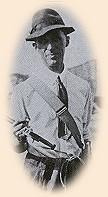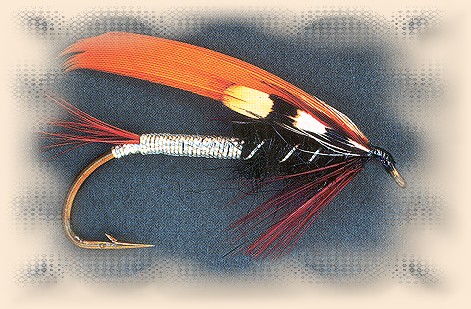From Fly Patterns and Their Origins by Harold
Hinsdill Smedley, "This fly is named after its creator, Brigadier
General Noel Money, of Qualicum Beach, Vancouver Island, British
Columbia.
Roderick Haig-Brown dedicates his two volumes, The Western
Angler, 1939, to the General, who he says, 'is the finest
and most experienced steelhead fly fisherman in British Columbia.'
Two more of the General's favorites are Dick's Fly and the
Prawn Fly."
Quoting from some letters written to Harold Hinsdill Smedley by
the General in 1939, "In some of the big rivers on our West Coast
we have a run of these big trout [winter steelhead] starting in
May and going on to October. This fly fishing, I consider the
best in Canada, except for Atlantic salmon in the East, but our
steelheads are better fish than salmon - much more lively and
jump more. Twenty-three and one-half pounds is the heaviest
I know of."

In Fly Patterns of British Columbia, author Arthur
James Lingren states, "The General, after coming to British Columbia
in 1913, fished extensively on the east coast of Vancouver Island,
but his favourite stream was the Stamp River, near Port Alberni located
at the head of Alberni Inlet on the west coast of Vancouver Island.
In a note written in his game book on October 14, 1922, the General
commented on the fishing he experienced in this uncrowded land: "A
grand season 77 fish, averaging just under 7 pounds - all rainbows
[steelhead] but 2, which were cutthroat trout . . ." The General,
one of British columbia's first steelhead fly fisherman, had a profound
influence on the young Roderick Haig-Brown and what he was to later
write about steelhead fly fishing."
When the General passed on in 1941, Mrs. Money passed his fly box on
to Haig-Brown and Haig Brown filled emply clips with some of his own
or flies given him. Haig-Brown valued the contributions of those that
came before him and, although he did use some of the Money patterns,
he preserved this Money treasure and it is now part of our fly fishing
heritage."
General Money No. 1
Hook: Number 2/0 to 4.
Tag: Oval, silver tinsel.
Tail: A small clump of golden pheasant breast feather fibres.
Body: Rear 2/5s of oval silver tinsel; front 3/5s black polar bear
underfur or black wool.
Ribbing: Oval silver tinsel.
Throat: Burgundy hackle.
Wing: Orange swan.
Cheeks: Jungle cock.
Originator: General Noel Money.
Intended Use: Wet fly for summer steelhead.
Location: Stamp River, Vancouver Island, B.C., Canada.
"General Money's flies were some of the first patterns developed
for British Columbia's summer-run steelhead. Money's No.1 and 2
patterns were a result of many years' experimentation with different
colour schemes and fly tying material combinations.
General Money's No.1 fly with its colour combination of silver,
black, orange and burgundy is quite unique. . .
For decades, until it went out of business in April 1982 after
63 years, Harkley & Haywood sporting goods store in Vancouver was
the emporium of choice for many sportsmen. They kept a record
of yearly fly sales and into the 1970s General Money's patterns
topped the sales list for steelhead patterns."
~ DLB
Credits: Dressing, fly photo, photo of 'the General' and
last three paragraphs from
Fly Patterns of British Columbia by Arthur James Lingren,
published by Frank Amato Publications,
Portland Oregon. Other credits as noted in the text. Ours sincere
thanks for use permission.
|


